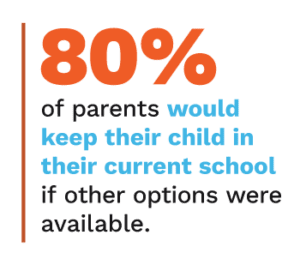
categories
Why Does A State Like Texas Reject School Vouchers?

January 24, 2022
We’re Smarter Than That.

If there’s one thing Texans take pride in, it’s their individuality. Their freedom. Their communities. Their tradition for doing things better and in their own way.
And when it comes to school vouchers, we’ve avoided the trend knowing there are far better ways of improving schools.
Desperate to respond to the pandemic, some states have turned to school vouchers in hopes of a silver bullet.
In Pennsylvania, legislators expanded a tax credit giveaway that will funnel state money to private schools. In New Hampshire, they diverted money to private school “savings accounts.”
In Ohio, it was a “scholarship,” and now hundreds of schools are mounting a legal challenge to a voucher program that has grown exponentially, segregating communities and costing taxpayers $2 billion over the past decade.
In Texas, we know better. We’ve seen the research, and it’s clear that voucher programs, while marketed as a solution to failing public schools, don’t improve academic outcomes for students.
As we’ve seen in Ohio, what starts as a small, controlled program quickly balloons into a more expansive and costly one. And as is the case with Arizona’s “Empowerment Scholarship Accounts” program, vouchers end up often being used by wealthy families.
Moreover, vouchers do not always provide the support students and their families need. Vouchers for students with special needs have resulted in families losing their rights to transparency, accountability, oversight, and an inclusive setting.
Rather than wasting money on unproven experiments with our education dollars, Texas has focused on shaping a public education system that provides real choice for all students. One that gives transparency to parents, taxpayers, and policymakers and receives high marks for its overall statewide funding equity.

A recent poll by the Charles Butt Foundation found that parents, even when struggling through the pandemic, believe in their public schools. Overall, their ratings of their public schools are at an all-time high. In addition, a strong majority of parents feel they have a choice in where they send their students to school, and over 80 percent would keep their students in their neighborhood school even if other options were available.
Our teachers, meanwhile, have a done tremendous job throughout the pandemic and our state leaders, for their part, provided support as well. This includes the passage of 2019’s House Bill 3, which pumped an additional $2 billion annually into schools, and again in 2021 when they flowed nearly $19 billion in federal aid for COVID relief to address learning loss. Another meaningful thing the Texas House did in 2021? They rejected vouchers again, soundly.
Texas House Rejects School Vouchers
In 2021, the Texas House of Representatives reiterated their opposition to vouchers, voting 115-29 to prohibit state funds from being used for a voucher.

Yes, here in Texas, we know vouchers don’t increase choices; they lessen them. They drain money from the system, which impacts teacher salaries and programs such as dual language, STEM, and early college.
We know a system of well-funded, locally accountable public schools not only gives students the freedom to chase any dream, it gives communities a say in what is being taught in classrooms and what skills are needed by the local workforce.
And finally, what Texans know is that we can’t give up. If anything, now is the time to double down on support for our public schools and the creative investments they are making in our students’ academic recovery from the pandemic and the programs we know work. We can’t allow a misguided voucher program to be the lasting legacy of the last two years.
We all have a role to play in shaping the future. And opting out of our shared responsibility is simply not an option.



